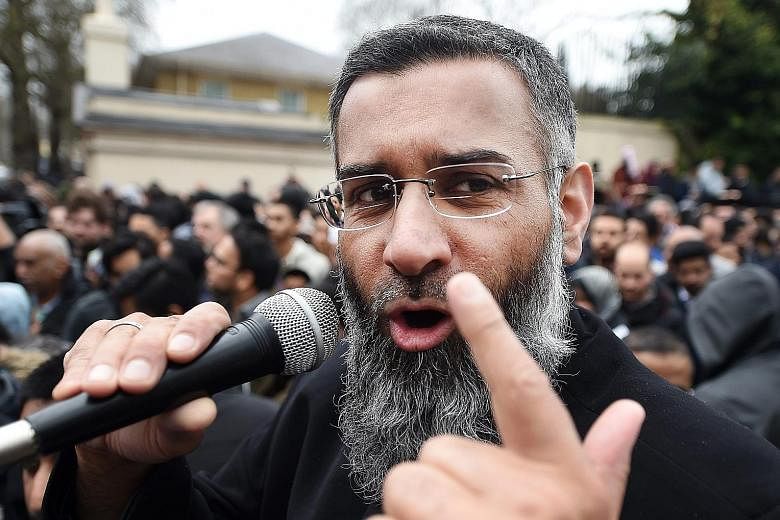For years, Britain's most notorious hate preacher Anjem Choudary has made no bones about wanting his birth country to adopt syariah law.
He held street protests, readily gave media interviews and spread his extreme Islamic beliefs in online lectures.
The 49-year-old famously said he wanted to turn Buckingham Palace into a mosque, and praised terrorists such as the Sept 11, 2001, attackers and the killers of British soldier Lee Rigby, who was hacked to death on a street in London in 2013.
For all his inflammatory public pronouncements, he remarkably managed to stay out of trouble with the law, spewing hate under the banner of freedom of expression, but taking care never to cross the line into litigious territory.
Two years ago, the police finally nailed him when he tweeted his support for the Islamic State in Iraq and Syria (ISIS) and signed an oath of allegiance to the militant group which appeared on a website.
-
Choudary's extensive web of terror
-
Anti-extremist advocacy group Hope Not Hate has called Anjem Choudary's Al-Muhajiroun network "the single biggest gateway to Islamist terrorism in the UK". Experts believe it has encouraged hundreds of radicalised Muslims to fight abroad and plan attacks on the home front.
1. THE SHOE BOMBER
Briton Richard Reid, 28, was seen at several Al-Muhajiroun events months before his failed attempt to bomb American Airlines Flight 63 from Paris to Miami with a bomb hidden in his shoe in 2001 .
2. THE LONDON BOMBINGS
The four suicide bombers who blew up three underground trains and one bus on July 7, 2005, were all members of Al-Muhajiroun. Mohammad Sidique Khan, the group's leader, also used Al-Muhajiroun safe houses.
3. THE LEE RIGBY MURDER
Two British men of Nigerian descent, Michael Adebolajo and Michael Adebowale, hacked a British soldier to death in a street in London on May 22, 2013. They said they wanted to avenge Muslims killed by British armed forces. Both had been filmed at Choudary's rallies.
4. THE BELGIUM CONNECTION
Choudary had given advice to Belgium's most prominent recruiter Fouad Belkacem on how to start a radical group. Sharia4Belgium was launched around 2010, with more than 50 members leaving to fight for ISIS and Al-Qaeda at the beginning.
5. THE ISIS EXECUTIONER
Siddhartha Dhar, or Abu Rumaysah, was once a right-hand man to Choudary before he fled to Syria in 2014. He is said to have replaced Briton Mohammed Emwazi, better known as Jihadi John, as an ISIS executioner.
6. THE SINGAPORE CONNECTION
Singaporean Zulfikar Mohamad Shariff, 44, who was arrested and detained last month in Singapore, was an associate of Choudary. The Ministry of Home Affairs said Zulfikar, who had been living in Australia for 14 years, glorified ISIS in Facebook posts.
Tan Dawn Wei
Choudary might have thought it could be argued that he was pledging allegiance to the political ideology of an Islamic state, but jurors at London's central criminal court were convinced he was swearing loyalty to ISIS, an organisation that has been proscribed, or banned, in Britain since 2014.
Last Tuesday, the authorities announced that the court had found him guilty of encouraging support for ISIS, and he faces a possible jail term of 10 years.
The conviction is a major coup for British prosecutors, who have been trying to stem the preacher's powerful influence and bring him to court.
Charged under section 12 of the Terrorism Act 2000, which makes supporting a banned organisation a crime, Choudary is not an Islamic militant who built bombs and carried out deadly attacks, nor has he masterminded any terrorist plots.
But the radical ideology he spreads, much like other hardline clerics like Anwar al-Awlaki and Omar Bakri Mohammed, is potentially far more dangerous for the impact it has. The father of five has been linked to at least 15 terrorist plots and hundreds of his disciples are believed to be fighting for ISIS.
Commander Dean Haydon, head of Scotland Yard's counter-terrorism command, said: "These men have stayed just within the law for many years, but there is no one within the counter-terrorism world that has any doubts of the influence that they have had, the hate they have spread and the people that they have encouraged to join terrorist organisations.
"Over and over again, we have seen people on trial for the most serious offences who have attended lectures or speeches given by these men."
Born to a Pakistani market trader in Welling in the London borough of Bexley, Choudary was known as "Andy" when he was a medical student at the University of Southampton. He later switched to law and, while he identified as a Muslim, he was also known to drink, party and take drugs.
He became deeply religious after meeting Syrian Islamic leader Omar Bakri Muhammad at a mosque shortly after he graduated.
Bakri founded Al-Muhajiroun, an extremist organisation in Britain that was later banned by the government. The radical Islamic group has been linked to at least 23 planned terror attacks in Britain, and has regrouped under different names after it was outlawed.
When Bakri fled Britain after the July 7, 2005, London bombings, Choudary took over the leadership.
Choudary has denied that he encouraged British Muslims to take up arms, insisting he was just a "lecturer in syariah law giving the Islamic perspective". In an audio clip that was on Choudary's YouTube channel and played to jurors, Choudary speaks of how he sees ISIS as meeting the criteria of a legitimate Islamic caliphate. He said that "obedience to the caliph is an obligation, if they rule by the syariah. And to obey them obviously means they must be established".
The authorities tapped 20 years of material in prosecuting Choudary, including assessing 12.1 terabytes of storage data on 333 electronic devices.
"It seems incredulous that he was allowed to continue all these years," said Mr Nick Lowles, executive director of advocacy group Hope Not Hate to The Washington Post.
"This really does put an end to his organisation. Others will try to step into his place. But the people who come after him won't have the same credibility or media profile."
Mr Patrick Dunleavy, the former deputy inspector-general of the New York State Department of Corrections and author of The Fertile Soil Of Jihad, warned that Choudary, when in prison, could continue proselytising "in an environment that guarantees him a captive audience of people who already have a disdain for government and a predisposition for violence".
"It remains to be seen whether Choudary will have direct contact or will communicate through kited letters or other illicit prison communication methods. But he will continue to get the radical Islamic message out unless the authorities stay one step ahead of him," he said.


